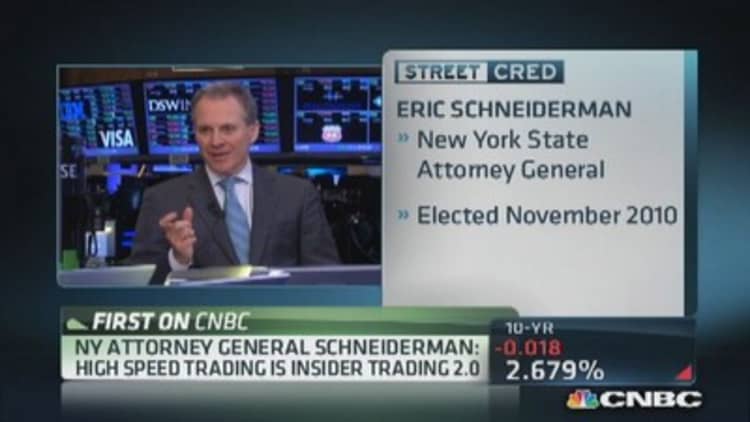
Regulation of high-frequency trading is needed to protect the markets, New York Attorney General Eric Schneiderman said Tuesday on CNBC.
"The point is we have to keep up with technology," he said on "Halftime Report." "We're not going to stop technology, but the law and regulations always have to adapt."
Schnederman's office announced a probe into services that facilitate high-frequency trading and whether they provide improper advantages to traders.
"High-frequency trading is with us," he said on CNBC. "It's not going away, but we have to make sure we have a set of laws and regulations that send a message that everyone still has a fair shot to compete. The problem is that there are types of information that are not really traditional insider information. They're not about, 'Exxon's about to strike oil in Alberta.' Just a few seconds of a glimpse of a consumer survey, which is what Thompson Reuters was providing to HFTs. To their credit, we got them to stop doing that."
(Read more: High-frequency trading: Virtu opens investment door)
Schneiderman also credited BlackRock, the world's largest asset manager, for ending its analyst survey program worldwide as part of an agreement with his office.
"The problem is high-frequency trading—it creates liquidity; that's a good thing—but it creates instability, and that's a bad thing," he said. "And the constant arms race of people having the incentive, which they have now, to try untested methods to gain those extra milliseconds of speed—that is a danger to the markets."
Scheinderman suggested that frequent batch auctions might be one solution.
The practice would help maintain liquidity in the markets while removing the ability for traders to exploit momentary mispricings with increasingly faster computers.
(Read more: High-frequency trading needs some regulation)
"They're using arbitrage between exchanges now," he said. "Tiny, tiny differences in the timing of pricing can now make money for these folks. So, what my proposal was, as regulators—the federal government's got to be involved in this, too, CFTC and SEC—we've got to step up to the plate and deal with the challenges of this new technology."
Schneiderman said he wasn't thinking about proposing a tax on certain kinds of trading.
"I'm a big fan of America's capital markets," he said. "In the last five years, we have funded something like five times all of Europe has funded in terms of investments and start-up companies and almost five times the rest of the world," he said.
"Right now, because of this constant quest for those extra milliseconds, the markets are at a little bit more risk than they need to be. We can preserve the liquidity by something like our frequent batch auction proposal, which is being discussed at a forum at New York Law School right now, while protecting the markets and capping the race for speed."
A favored tool of hedge funds and other institutional traders, high-frequency trading has been in regulators' sights now for years, but experts have remained divided on whether the practice helps or harms markets.
Reuters reported last month that Berkshire Hathaway's Business Wire would no longer sell potentially market-moving press releases directly to high frequency-trading companies, after months of discussion with Schneiderman's office.
—By CNBC's Bruno J. Navarro. Follow him on Twitter @Bruno_J_Navarro. Reuters contributed to this article.


